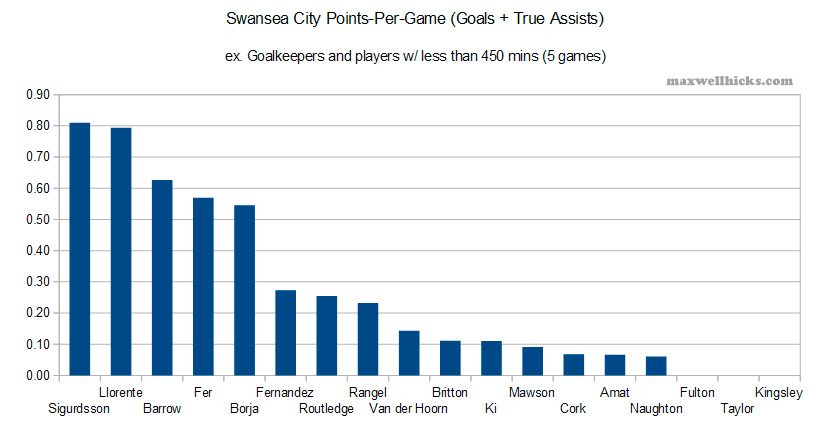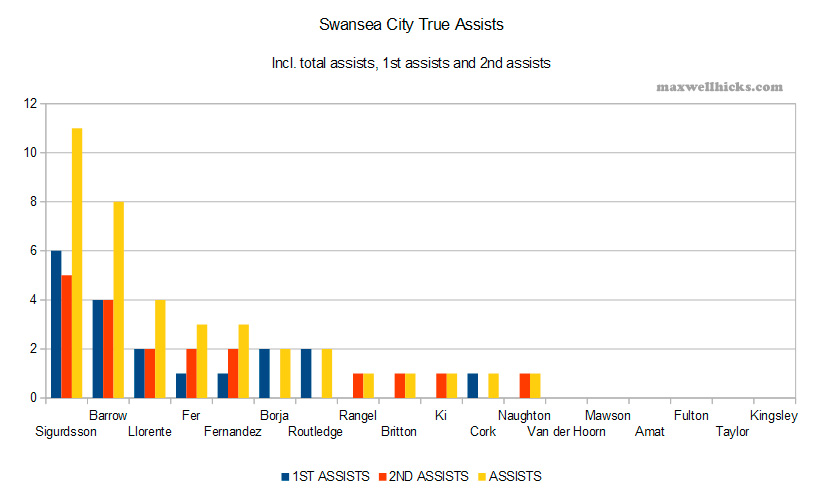This article was written on January 31st 2017 — transfer deadline day — before Swansea’s 2-1 win over Southampton.
I recently wrote a piece exploring the offensive contribution of Swansea’s players from the 2015-16 season. The piece was built on a system of awarding assists on a more comprehensive basis than that which is currently used by the Premier League. I’ve used the same system here to evaluate Swansea’s players over the first half or so of the 2016-17 season.
The stats here represent every Premier League game up until the 2-1 win over Southampton on Transfer Deadline Day, although that game wasn’t included. TDD seemed like a good place to stop and take a look at which players have been contributing the most, given the likelihood one or more of them might be sold or loaned out by the end of the night.
One player in particular — Mo Barrow — appeared to fall out of favour with new boss Paul Clement and was shipped to Championship side Leeds United for the remainder of the season. Striker Borja Baston might have been loaned to Villareal had a last-ditch attempt to sing Ishak Belfodil from Standard Liege been successful. The stats will show that both men have more value to the club than might be assumed.
To quickly recap, assists for this article (i.e. ‘True Assists’) are calculated as follows:
When a goal is scored, each of the last two Swansea players to be involved in the play are given an assist. The player supplying the final ball is given a 1st assist, the player who passed the ball to the provider is given a 2nd assist. Additionally, a player winning a free-kick, corner or penalty from which a goal is scored can be given an assist. Some goals can be unassisted, for example if the scorer robs the ball off a defender and scores without help from a teammate. This system provides a far more useful overview of which players are actually making valuable contributions to the attacking phase of play — i.e. making plays which lead to goals.
Points-Per-Game
PPG is the combined average of goals and assists tallied per-game per-player. A player with 0.5 ppg is contributing to a goal being scored once every two games, either by scoring themselves or by providing an assist in some way.

It should come as no surprise that leading the team are Gylfi Sigurdsson and Fernando Llorente. Before it proves anything else, this chart demonstrates beyond doubt how wise Swansea were to hold on to their two most productive players in this transfer window. That much is obvious, but more surprising are the contributions of Mo Barrow and Borja Baston. Neither player has scored much — Borja has one league goal and Barrow none — so the contributions from these players have come primarily from assists.
Assists

Barrow’s role as provider is clearly shown here. The Gambian is second only to Sigurdsson, who chalks up most of his assists as the team’s dead-ball specialist. What the figures won’t show is that one of Barrow’s greatest gifts is getting fouled. Several of his assists have been the result of earning free-kicks from which Sigurdsson has been able to do some damage. Additionally, the Gambian wins corners by using his pace to force the play down to the byline, and again Sigurdsson is there to capitalise.
Some might say Barrow lacks an end product, but much of the time he is fouled before he gets a chance to cross or shoot. On a side with a player like Sigurdsson ready to take full advantage of set-piece situations, a player who can draw physical attention and get himself kicked a lot has value. During his time at Swansea, Andre Ayew was among the league’s most frequently fouled players. His brother Jordan, another dribble-first/pass-later style of player, could become Swansea’s latest foul magnet when he joins the side in the next couple of weeks.
Let’s see how all these figures break down into per-game contributions.
Assists-Per-Game

It might come as a surprise to learn that Barrow actually sets up more goals than Sigurdsson, or at least plays a part in doing so. The reason Barrow leaps ahead in this chart is down to playing time — the winger had played 1149 minutes (nearly 13 games) at the time of writing compared to ever-present Sigurdsson’s 1889 (very nearly 21 games). In terms of per-90 minute contributions, Barrow was Swansea’s best provider, although ironically many of his assists would have relied on Sigurdsson’s set-piece skills to become goals.
Also of note here is the contribution of Borja Baston. The Spaniard is third in the chart despite only playing 495 minutes (5.5 games). Borja has mostly seen action as a late sub in situations that do not always give him the best chance to shine — imagine what he might do when given a proper role. Wrongly seen as a flop by some quarters of the press, Swansea might yet be thankful their deal for Belfodil didn’t come off.
There are other reasons which have stunted Borja’s Swans career to date — his early-season injury, and the fact Swansea are geared to play around a target man such as Llorente rather than a direct no-nonsense finisher like Baston. And with so little data to evaluate, it is hard to say with certainty that the striker will always achieve 0.55 ppg, but the signs are certainly promising.
As for Barrow — Swansea will very likely recuperate the value of his assists through dribbler Ayew and new winger Luciano Narsingh. In the meantime, Leeds United should work out a few free-kick routines to get the most out of their new player, though Championship refereeing may not reward the Gambian quite as frequently as Premier League refereeing has done.